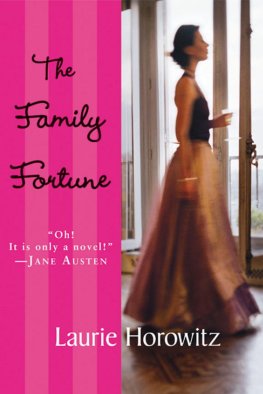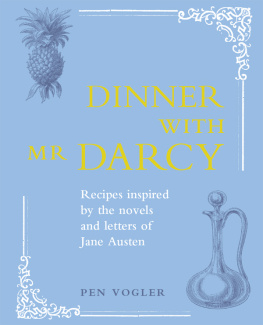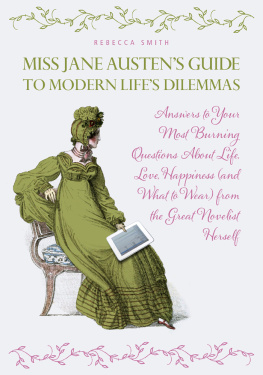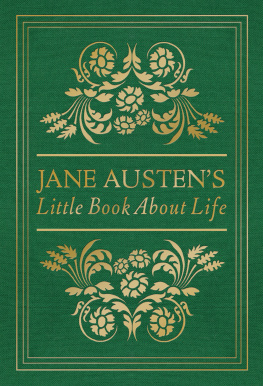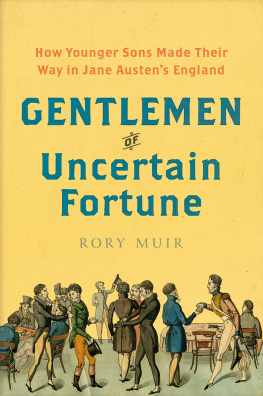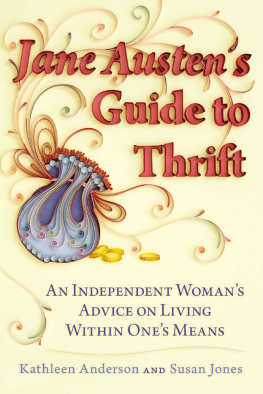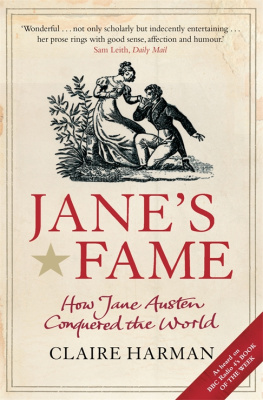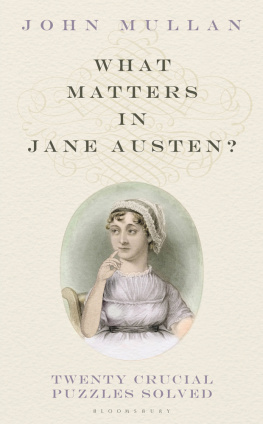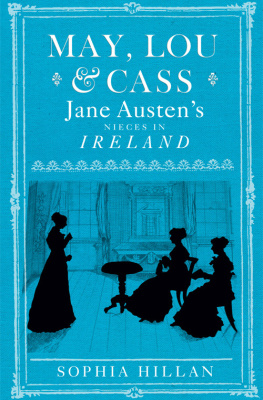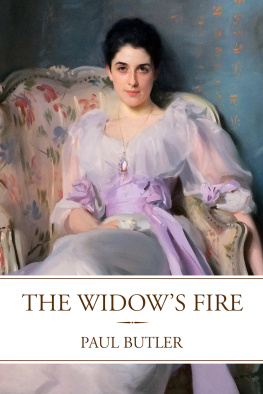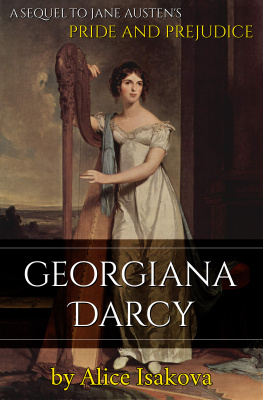Laurie Horowitz
The Family Fortune
For my father, Benedict Horowitz,
who would have been so proud
All the privilege, I claim for my own
sexis that of loving longest, when
existence or when hope is gone.
Jane Austen,
Persuasionand their prejudices reminded him of
sign-posts warning off trespassers who
have long since ceased to intrude.
Edith Wharton,
The Custom of the CountryAnd this is good old Boston,
The home of the bean and the cod,
Where the Lowells talk to the Cabots
And the Cabots talk only to God.
John Collins Bossidy
Chapter 1
In which we are introduced to Miss Fortune
I once knew a girl named Hope Bliss. How her parents didnt realize that they were putting a curse on her, Ill never know. I myself am a Fortune, from a long line of Fortunes, and though I am simply Jane, I live under the cloud of being Miss Fortune, though I prefer Ms.
At thirty-eight I still lived at home. I told myself I had good reasons for that, or at least excuses. My sister Miranda lived there, too, and she was almost forty, even older than I was. Ours was not an ordinary house. It was a stately town house in Louisburg Square, a prestigious and historic location on Beacon Hill. The only people who could afford to live there were the nouveaux riches and people like us.
Who were we, the Fortunes of Louisburg Square? We were the old-money aristocracy. During the time of the robber barons, the Fortune family was in textiles, but most of our money came later, from an array of fancy mustards. We had been, you could say, the condiment kings of the East. We had, however, sold the company to Basic Foods before I was born.
I had known boys who came out of the womb in dinner jackets and girls who could preside over high tea before they could speak in full sentences, but really, what was the relevance of that in the new millennium?
We old-money Bostonians were an anachronism, the Lost Tribe of the Wealthy, wandering through the desert of modern life, cut off from the world, never realizing that our days were numbered. We were a generation of dilettantes, trying our hands at cooking, weaving, pottery, always with a dwindling trust fund to back us up. Our creativity, our determination, and our will to succeed had been diluted by comfort. We existed on the complacent understanding that we never had to strive for anything. Our ancestors had been captains of industry, but some of us had never even held a job. Deep down, we knew we were becoming obsolete. Maybe thats why we, the old guard, kept such a tenacious grip on our way of life.
Louisburg Square is one of the stops on the many walking tours of Boston. The town houses in the square encircle a shared and gated park. The park is charming in all seasonssnow-laden or bright with blossoms. Our square is, in its way, quintessential Boston with its bricks, bay windows, and cobblestones.
Though our house could have accommodated the entire string section of the Boston Symphony Orchestra, the only people, besides my sister and I, who lived there were my father, Theodore Henry Adams Fortune III, whom everyone called Teddy, and Astrid Fonseca, our housekeeper and cook.
My younger sister, Winnie, was married and lived in a neighboring town with her husband, Charlie, and their two boys, but Miranda and I had never left. We were modern spinsters, remaining at home long after any self-respecting woman would have moved out.
Our mother died right after I graduated from college, and thats the time you are supposed to make plans for the next stage of your life. Whether its graduate school, work, or simply a studio apartment in a questionable part of town, the big choices are upon you.
Somehow I never got around to making them.
Not long after my mother died, I fell in love with a man named Max Wellman. He asked me to move to California with him, but my mothers best friend, Priscilla, talked me out of it. She said that Id ruin his life, which, looking back, doesnt say too much about what she thought of me at the time. Maybe she just wanted to keep me at home. Priscilla doesnt like change and Im sure my mothers death was all the change she could tolerate.
After my mother died, Priscilla swept in to help our family get back on its feet. Who knows, maybe Priscilla was trying to cushion her own loss when she bought that apartment right around the corner on Mount Vernon Street. She and my mother had been best friends since they were children. Priscilla, who had been divorced for many years, made our family her own.
My fathers most endearing quality is his awareness of his own limitations, so without my mother to guide him, he relied on Priscilla for all sorts of thingsmainly her judgment. Many people in our set thought Priscilla would marry my father after a respectable time. I knew better. Pris thought Teddy vain and foolish, though when my mother was alive, Pris put a good face on it. Later, she told me that my mother had been able to disguise many of my fathers failings. Thats what marriages are for, Priscilla said, to shield your partner from the worlds bad opinion. I hoped that marriage was more than that. Priscilla said that if she had to listen to Teddy crack his knucklesone of his few unattractive habitsfor the rest of her life, shed find a way to jump from the Hancock Tower.
I swear to you, Priscilla said, your mother died of boredom. No, I thought. It was definitely the cancer. They looked like a perfect match, your mother and father. They each came from old Boston families. There was absolutely no opposition to their marriage even though, by todays standards, they were young. And your father was even more handsome then than he is now. And he was so charming. How could she know that the charm was the sum and total of it? Jane, I would never want that to happen to you.
I dont blame Priscilla, not really. I was twenty-three and could have made my own decision. I just wasnt strong enough to fight the opposition, which included not only Teddy but also Maxs grandmother in Boca Raton.
So I lost my first love and first love never comes again. Thats what they say, the they of stories and fairy tales. Second love didnt come, either, which, I suppose, precluded third and fourth.
It wasnt so bad. I filled a niche in my family. I was the sensible one, the ponderous one, the one who did the extra laundry our housekeeper, Astrid, couldnt keep up with. I was the one who cooked on Astrids day off.
And though I wasnt crazy about itneither the niche nor the familyI was comfortable with it, and theres something to be said for that.
Sometimes I looked out my third-floor window and saw the tourists therein their sneakers and sweat suits holding guidebooks and cameras and staring up into our windows.
What were they thinking when they peered up at us like that? Maybe they thought that behind our bay windows we lived charmed lives. And depending on your idea of what a charmed life is, maybe we did.
Chapter 2
Jane stays home on a Saturday night
It was a Saturday night in August and it was not unusual for me to be sitting at home with a book on my lap. At some point in the evening I had fallen asleep in front of the empty fireplace.
I woke to the sound of my sister Miranda dropping her keys in the front hall.
Im exhausted and drunk, she said.
You were the life of the party, Teddy said.
It was the dress. It was expensive, even for mebut worth every penny. When she left the house that evening she was wearing a midnight blue sheath that accentuated her narrow hips. The color would have made her look cadaverous had she not drenched her porcelain skin with expensive self-tanners. She used makeup liberally and was no stranger to artifice. Miranda, though she was flat as a pancake, always allowed her nonexistent breasts to precede her into a room. She had such a regal way of walking that she could actually convince you that her figure was something more than that of a prepubescent boy.

